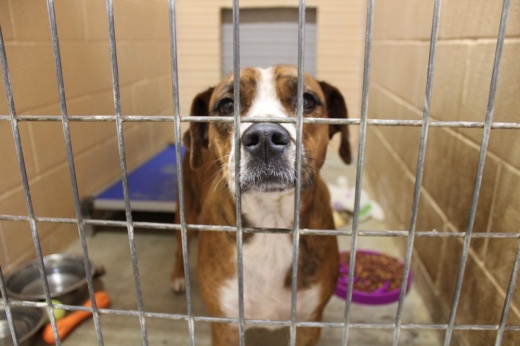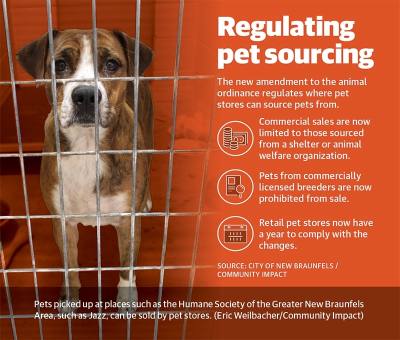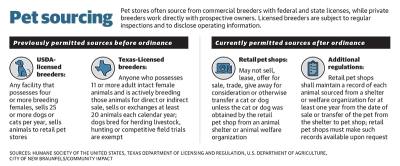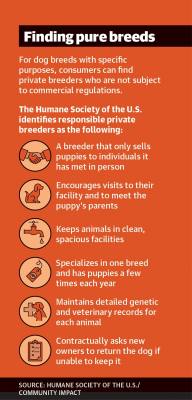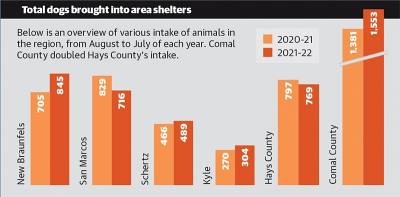On Oct. 24, council members approved the changes to the existing ordinance to include the prohibition of retail sales of pets within the city limits from a source other than an animal shelter or animal welfare organization.
Residents shared concerns about animals sourced from commercial breeders, specifically regarding the Puppyland store—which opened a location in New Braunfels in 2021—and their concerns about the practices of the business, in letters and statements to City Council.
The council voted twice on the issue in October, with Council Members Andres Campos, Christopher Willis, Lawrence Spradley and James Blakey voting in favor of the ordinance.
“In New Braunfels, we care about all of our residents, including the four-legged ones. This topic was researched thoroughly and a lot of citizen feedback was provided to staff and Council,” said Council Member Campos in an email. “We listen to our residents and an overwhelming amount of the feedback we received was in support of the ordinance. My vote reflected my own feelings on the topic and I believe it reflected the beliefs of our residents.”
Considering the options
City Council members initially made a recommendation in October 2021 to the New Braunfels Animal Advisory Board to discuss options for an ordinance to address commercial animal sales after an outpouring of community concern about the business.
Though the city had an existing ordinance on the books relating to the humane treatment of animals—such as requirements on chains, defining animal control officers, vaccines and other matters related to animals—this is the first ordinance change discussed that deals with the local sale of animals and their sourcing, said Christopher Looney, planning and development services director for the city.
“This ordinance would require any pet store in the city limits to obtain their cats or dogs from either an animal shelter or an animal welfare organization,” Looney said at the Oct. 10 meeting. “The draft ordinance also built in a grace period such that any existing pet stores can remain in business a year from final adoption.”
On May 4, the advisory board recommended an ordinance to regulate the sale of dogs and cats in pet shops, a decision that was more than six months in the making, seeking input from the owners of the Puppyland pet store, community members, animal welfare advocates and local shelters.
The new changes prohibit retail pet shops from the sale, lease or transfer of a dog or cat unless the animal was obtained by the shop from an animal shelter or animal welfare organization, according to city documents.
Additionally, the board recommended amending the definition of “animal welfare organization” in the existing code of ordinances.
Previously, an animal welfare organization was defined as “any not for profit group with 501(c)(3) status whose primary mission includes animal welfare,” according to city documents.
The recommended amendment adds the stipulation that such organizations do not include an entity that breeds animals or one that purchases pets from other breeders.
As with the ordinance in San Antonio, private breeders who sell directly to the public are not affected by the ordinance, such as breeders of hunting dogs that have few litters a year.
The ordinance now adopted by New Braunfels was modeled partially on a bill in the 87th Texas Legislature—House Bill 1818— that did not make it through the 2021 session, would require public documents of where every animal is sourced, according to Stacy Sutton Kerby, director of government relations with the Texas Humane Legislation Network.
Business pressures
Ultimately, those who opposed the change to the animal ordinance found the evidence of malpractice by Puppyland lacking and did not want the city stepping in and regulating a business.
“I don’t like the government telling businesses what they can and cannot sell,” said New Braunfels Mayor Rusty Brockman, who voted against the changes to the ordinance. “Being as emotional an issue as it was, so much information was presented over the months that I hope all that info was received and considered by the committee.”
Much of the concern centered around the surplus of dogs and cats in New Braunfels and Comal County rolling into shelters. The owners of Puppyland, Justin and Kayla Kerr, said that their pets for sale do not contribute to the issue of over-capacity in animal shelters, via a statement from their lawyers from the Seattle-based firm FMS Global Strategies.
“These ordinances do nothing to curb the tide of unwanted dogs and cats; nor do they contribute to New Braunfels’ issue of being unable to adopt pets. These draconian policies limit choice and create an unsavory black market,” Justin Kerr said in the statement. “Puppyland is committed to the ethical and humane treatment of animals; we do not source from puppy mills; and we are committed to our customers for the lifetime of their fur-ever friend. Placing burdensome regulations on our small family-owned business may lead to our having to close or relocate our store to a more pro-business environment, where all ethical treatment of pet sales is welcome.”
Sutton Kerby said that there is no way to tell if the animals sold commercially are coming from a “puppy mill” or not due to a decrease in regulatory oversight by the United States Department of Agriculture.
“We’re all given the reassurance that because of their USDA license, that there’s some oversight going on, but this just really is not the case. USDA has seen an unprecedented decline in their oversight of breeders in the last few years,” Sutton Kerby said. “From 2014-20, there was nearly a 90% decline in enforcement cases against bad breeders. So there is no effective oversight.”
Curbing the population
Despite the back and forth on the practices of Puppyland, discussion centered around stopping one more supply line to an area that is experiencing a growing population of pets.
Even with a smaller population, Comal County shelters have seen more than double the intake as Hays County, taking in 1,553 animals in the 2022 fiscal year to Hays County’s 769.
“Pet stores don’t have to sell puppies to do a thriving business and no one has to go out of business.” Sutton Kerby said.
She added that there are around 60 breeders within a 25-mile radius of New Braunfels of many types of purebred pets, and that it is unlikely stopping the sale of animals at Puppyland would inhibit consumer choice.
Sarah Hammond, director of the Humane Society of the New Braunfels Area, said the overpopulation problem has to do with a lack of spaying and neutering in the community.
“Please stop breeding your pit bulls; look at what’s in my shelter. Please stop,” Hammond said.
Paula Sardinas, CEO of FMSGS, the firm representing Puppyland, said the firm wants to continue the conversation and work to find a solution.
“We look forward to working with the mayor and the New Braunfels City Council on humane solutions. Our clients are focused on continuing to offer safe, healthy and humanely sourced fur-ever puppies to the citizens of New Braunfels,” Sardinas said.




